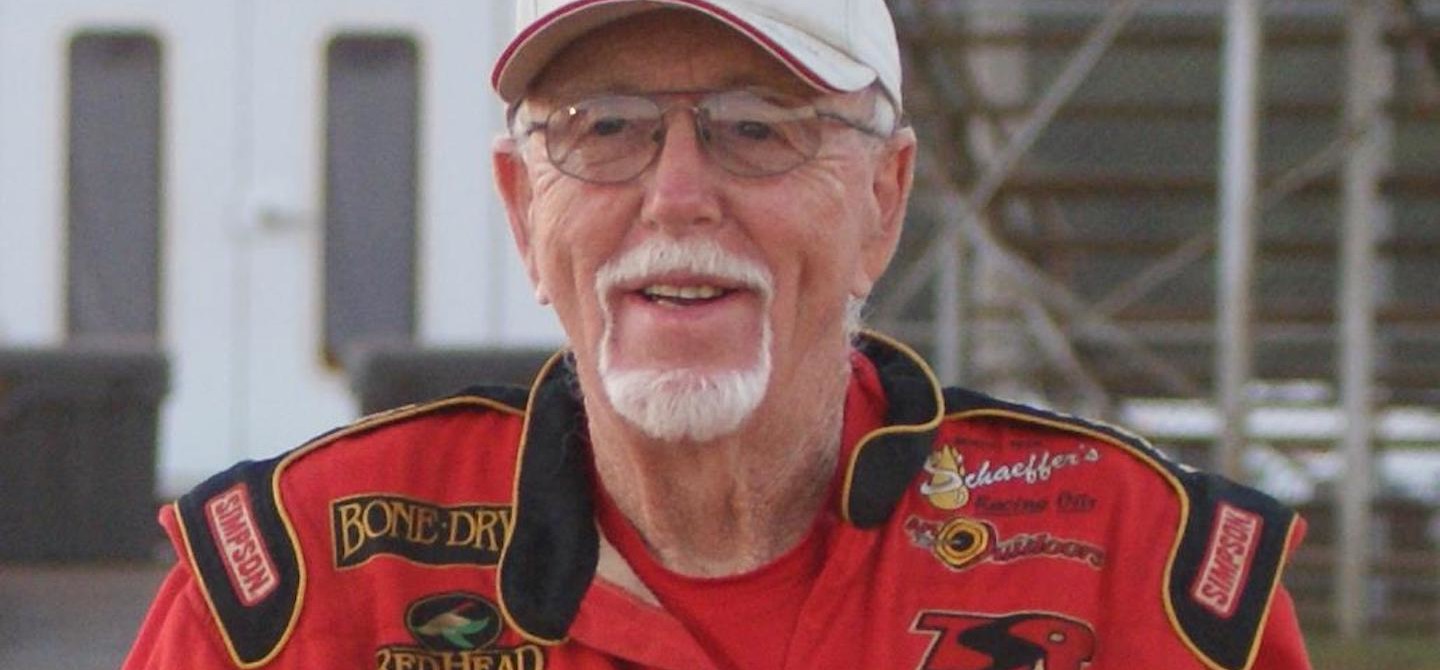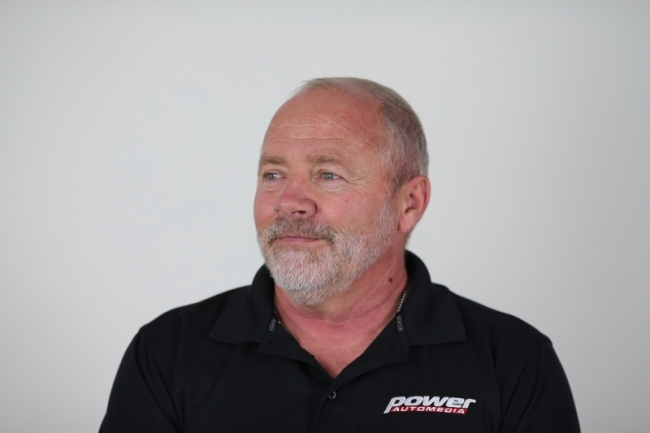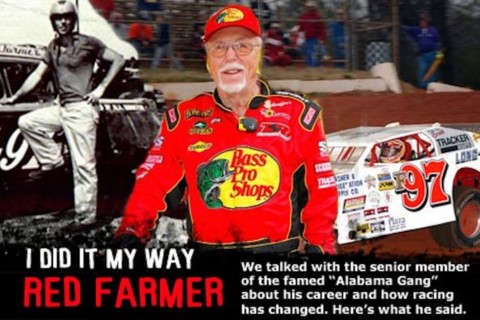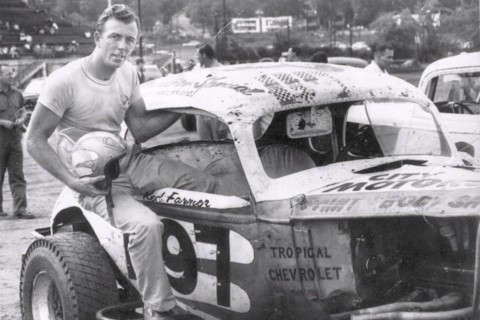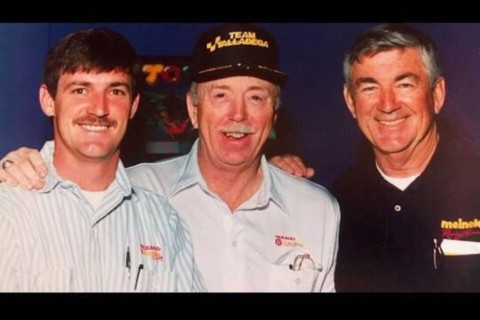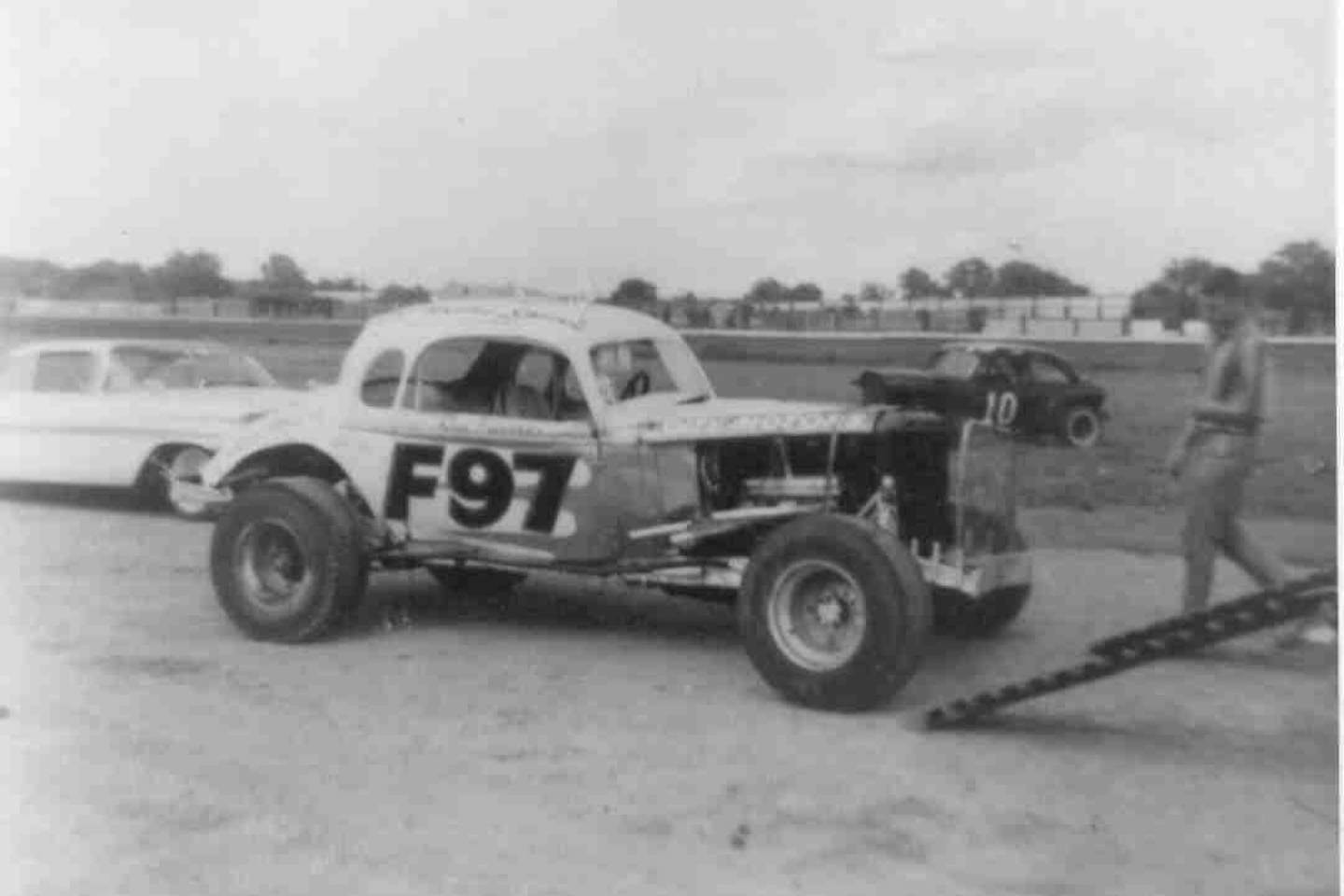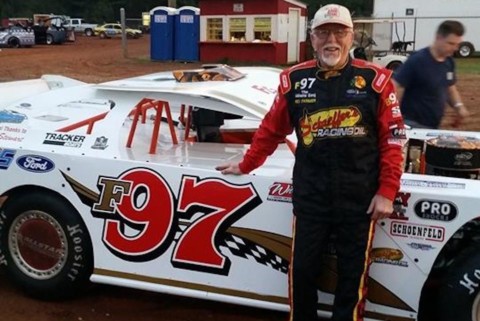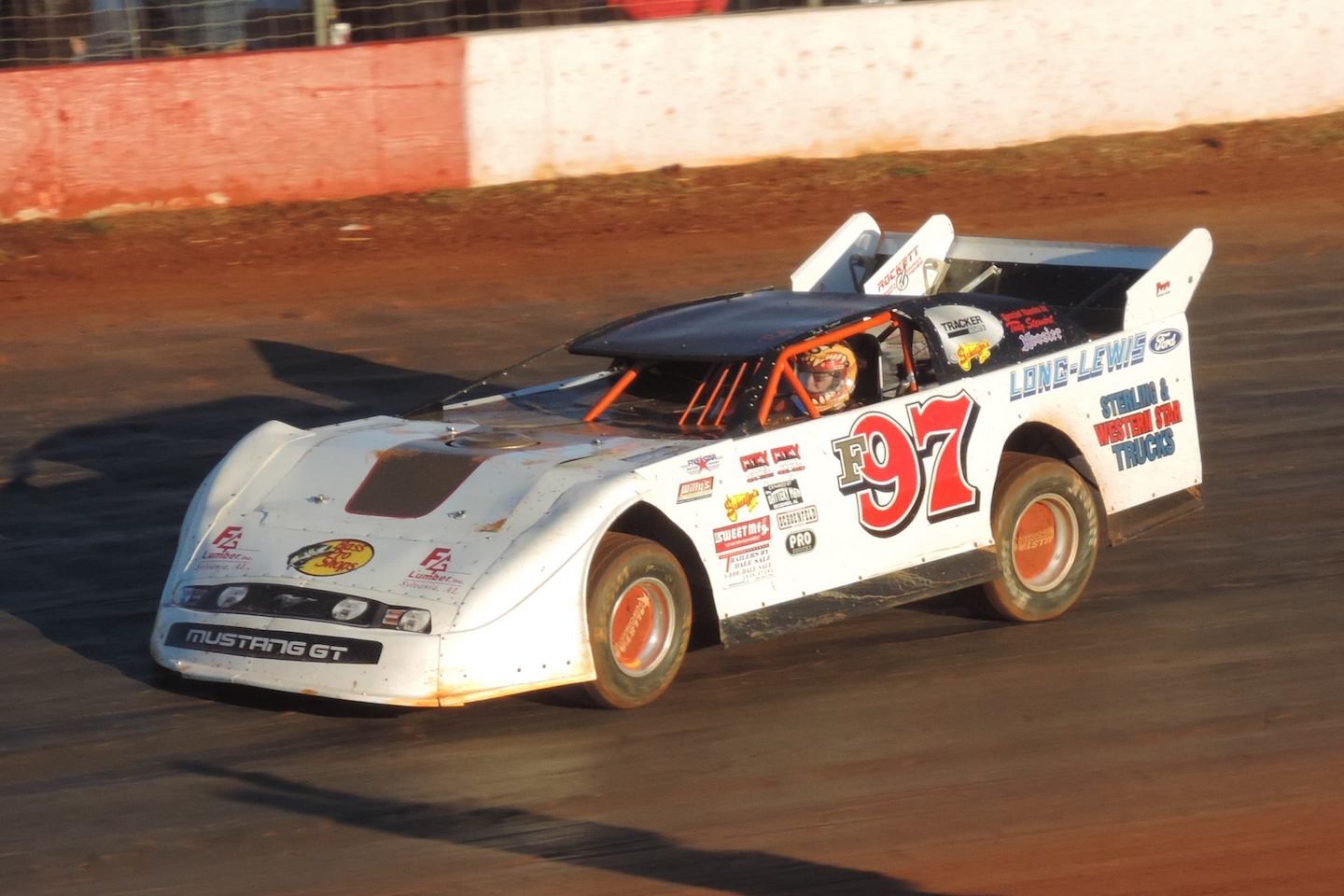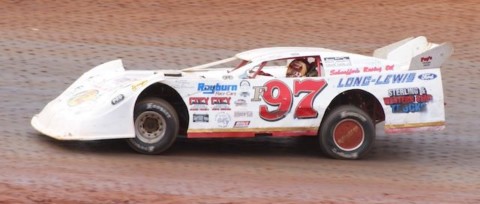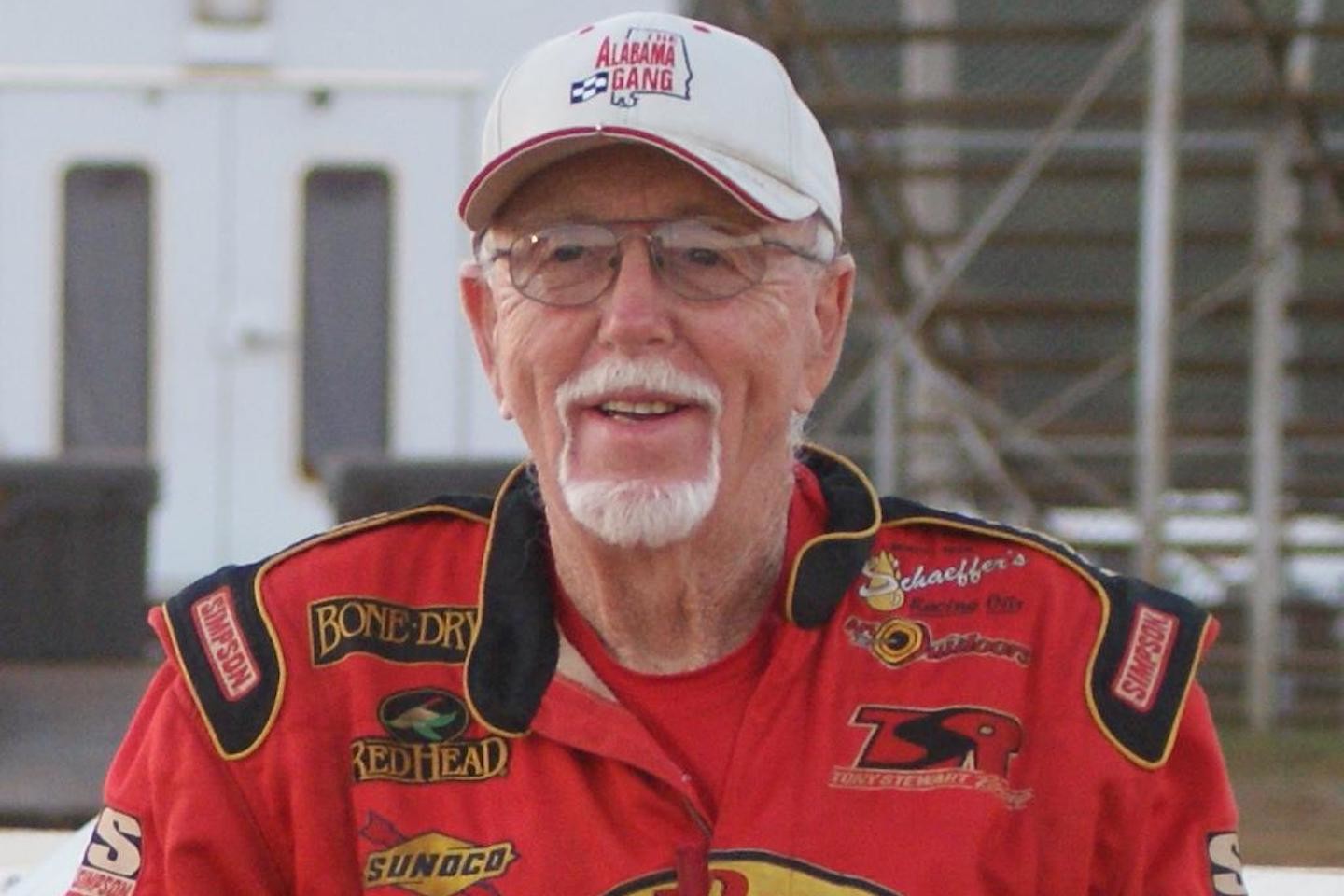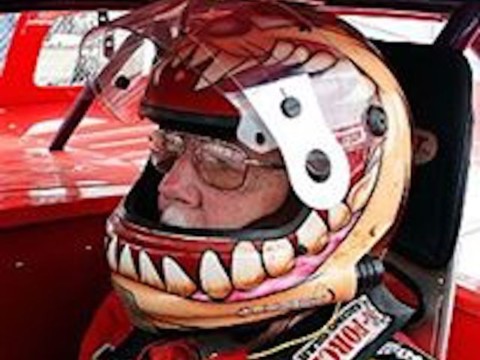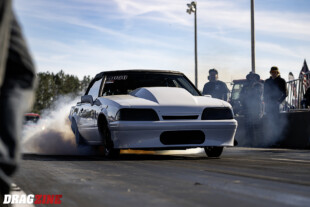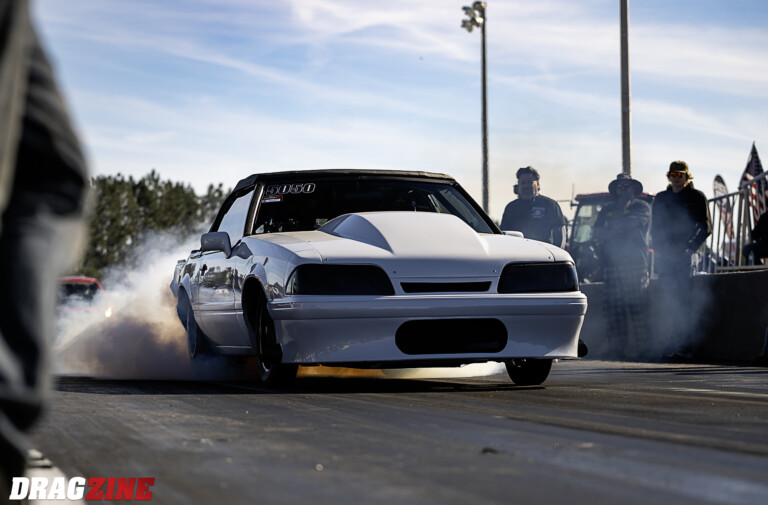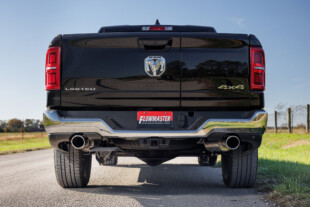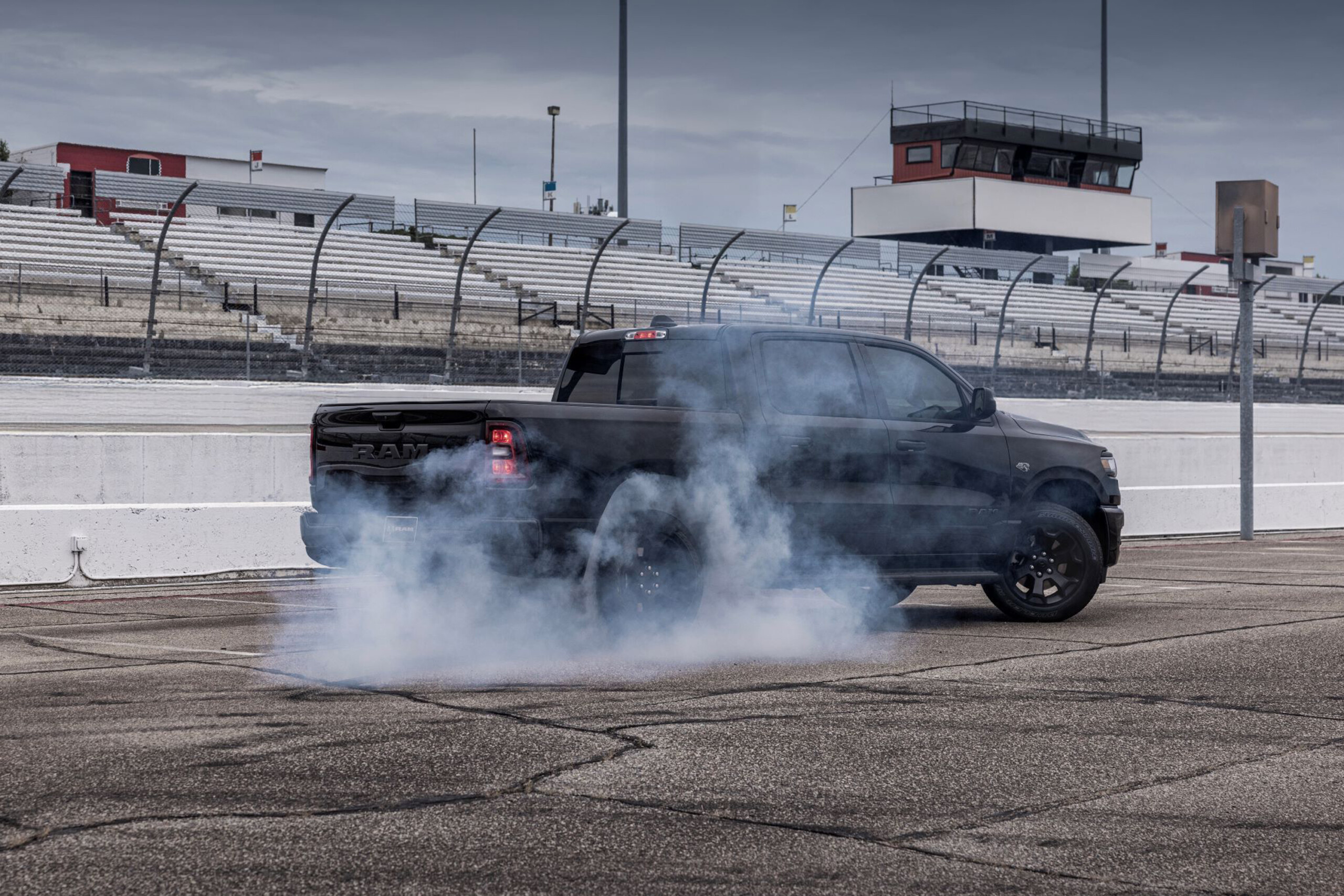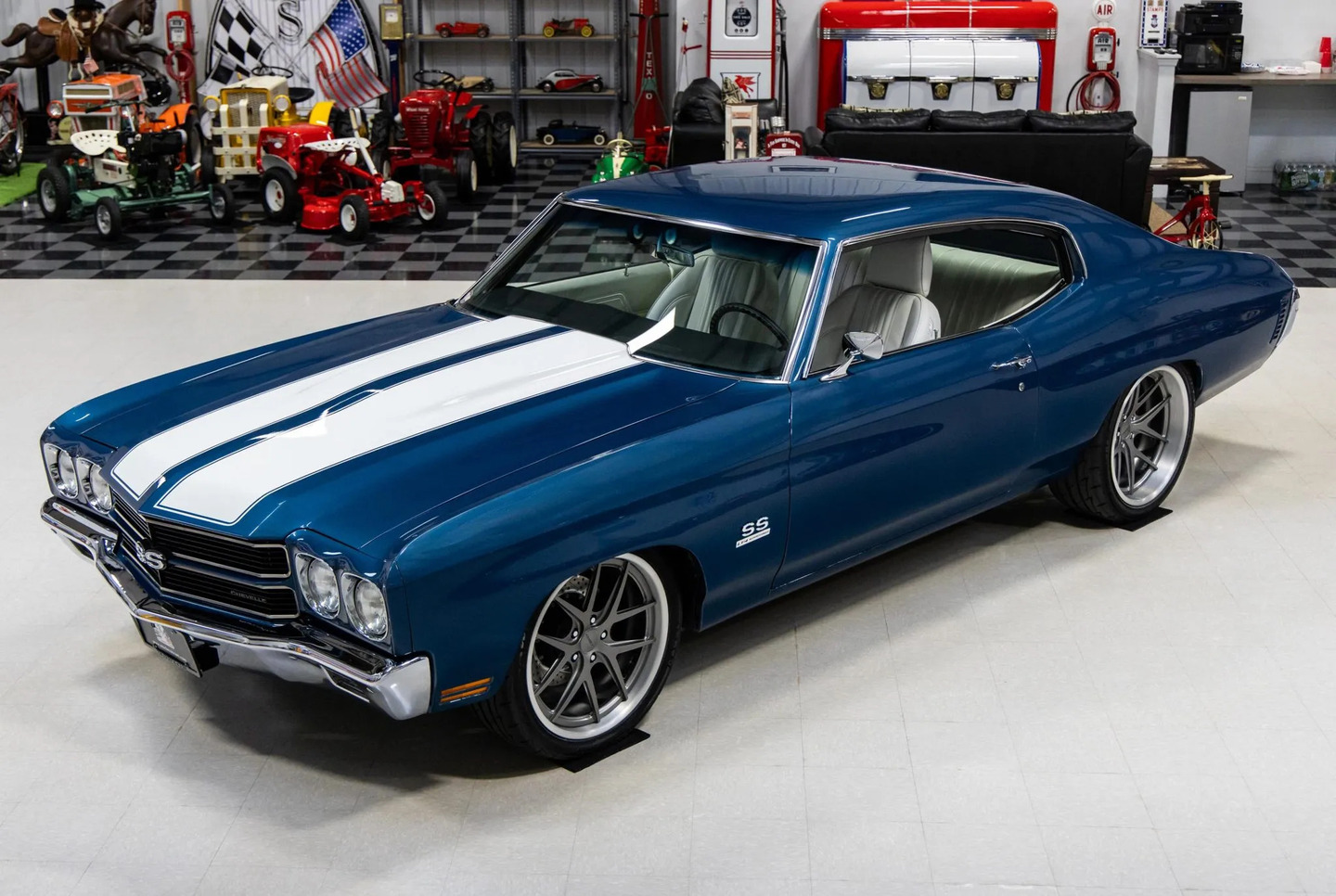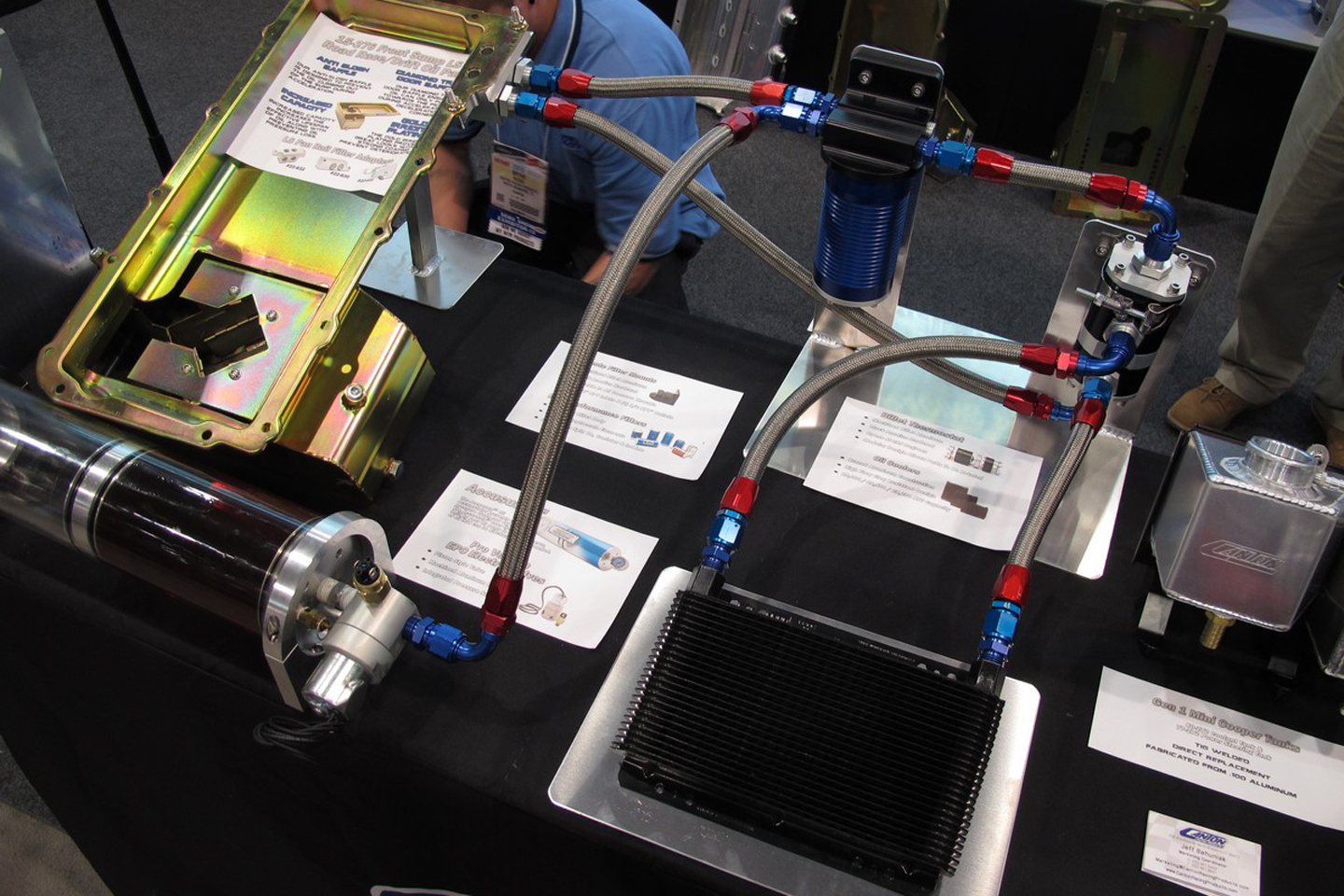Red Farmer is a short track God. A legend. Not a household name like Petty, Allison, or Earnhardt, but every racer across the nation knows him. Honest and candid, there are no mysteries about Red except his age, which he keeps a closely guarded secret. Red simply calls it as he sees it, and does things his way.
“Sometimes I get up in the morning and my busted ribs and busted legs are sore and I wonder whether it’s worth it.” ~ Red Farmer, September 1967
As of 2009, Red still figures it’s worth it.
Living life his way, Red has achieved success beyond what he could have ever imagined. Born in Nashville, Tennessee where he lived until his parents separated, Red found himself in Hialeah, Florida with his mother when he was about 14 years old. Red was admittedly a hellion as a teen, which led to his racing career. Learning how to drive on the streets of Florida, a friend’s father saw Red racing around the neighborhood and offered him a shot on the local track. And the rest, as they say, is history.
“Old Age and Treachery Will Outrun Youth and Skill” ~ Sign on the side of Red Farmer’s racecar.
Charles Lawrence “Red” Farmer is now in five different Halls of Fame, was named as one of NASCAR’s 50 Greatest Drivers in NASCAR history, was the NASCAR National Late Model Sportsman Champion (now known as the Nationwide Series) for three consecutive years from 1969 through 1971, and is still racing and winning, sixty-one years after his first race.
The International Motorsports Hall of Fame gave up and waived the five-year retirement rule and voted him in, figuring that Red would never retire. Along the way, Red was voted as NASCAR’s most popular driver four times, an honor that he cherishes because “at that time it was voting done by the people you race with and the NASCAR people,” states Farmer. “Fans weren’t allowed to vote for that then, and you didn’t have fan clubs sending in tons of votes for a particular driver.”
Estimates of Farmer’s career victory totals range from 700 to 900. He has won too many championships at local tracks to count but only raced in thirty-six NASCAR top division races from 1953 to 1975.
Believing that a Champion driver should help younger drivers, Red served as Davey Allison’s crew chief in the Busch Series and has helped mentor such drivers as Derrike Cope, Steve Grissom, his grandson Lee Burdett, and countless others.
In one of the most tragic events in NASCAR history, Farmer was a passenger in the helicopter crash at Talladega Speedway that took the life of Davey Allison. Red suffered only broken bones and a heavy heart.
Red has retained his driving skills in spite of his age, as evidenced in 2005 at Eldora, running in Tony Stewart’s Prelude to the Dream. Racing against current NASCAR Sprint Cup stars, Farmer won his heat race and placed 8th in the feature.
Red is famous for keeping his actual date of birth a secret, and various dates are listed in numerous articles and honors. The International Motorsports Hall of Fame lists his birth year as 1928. Other sources have the date listed as 1929, 1930, and 1931. When asked directly about his age, Red responds by saying “I ain’t sure, when I was born I was too young to read.” His wife Joan, however, set the record straight by telling the Hall of Fame Officials at the Alabama Sports Hall of Fame that Red’s official birthday is October 15, 1932. Farmer still plays coy about his age by saying, “she may have lied to them.”
When asked how much longer he plans on racing, Red replies, “I’ll drive as long as the youngsters don’t say ‘I wish that old man would get off the track and out of our way’ and I probably wouldn’t quit then. I’d make them run over me.”
True to form, we conducted the interview Red’s way. He talked and we listened. Here’s what Red had to say:
Red Farmer: You’re calling from California? I didn’t know these phones (cell phones) would work that far.
OneDirt: Yes Sir, I bet you didn’t think we had dirt track racing out here either.
Red Farmer: Well, yeah. But you got mostly Sprint Cars. Mostly Sprints and Midgets out there.
OneDirt: It’s changing. We’re seeing a lot more Late Models out here now.
Red Farmer: Yeah, I watched Billy Moyer run in a Victory (Circle) Chassis* out here the other night. Saturday night. He run a good race but he almost got lapped. There was ninety-something cars there and he was running tenth or eleventh place. Making the show is running pretty good with ninety-something cars. That means you had to beat about seventy cars to make the race.
OneDirt: Not all of us are Red Farmer and can win every night.
RedFarmer: Well, now…..he’s as good of a driver as you can get, that’s for sure. He’s the top banana.
OneDirt: A lot has been made of Karl Edwards’ and Mark Martin’s physical fitness program. We want to know, what is it that keeps Red Farmer on the top of his game and allows you to do the things you do at your age?
Red Farmer: Well, I don’t have no fitness routine like they do. When I was in the Army I lifted weights a little bit, and did a little bit more stuff, but since then I just stay active. Like I was telling you, I was changing the engine in my dirt track car yesterday. I put it on the scales, mounted some tires, moved some weight around and just work on my cars. Those guys don’t work on their cars so they gotta do something else. If they was spending ten to twelve hours a day on their race cars, they could stay in shape without doing all that stuff. I couldn’t just sit down and do nothing. I’m either fishing, hunting or racing.
OneDirt: How many nights a week do you race?
Red Farmer: I just run on a couple of the local tracks because I’m pretty much retired now. Just like a professional golfer that quits being a professional. He’ll still want to go out on the weekends and play a round with his buddies. That’s kinda the way I am now. I don’t race for a living anymore, I just race to enjoy it and have a good time, and I enjoy working on my cars and stuff like that. If I didn’t have my racing, then hell…..I’m not just going to sit in the house and watch soap operas all day. My theory is I’m going to wear out not rust out.
OneDirt: So you’ve never sat there and watched Oprah Winfrey?
Red Farmer: (disgusted) No. Never in my life and I never will.
OneDirt: Other than Red Farmer, who is the best driver you’ve ever seen?
Red Farmer: Now or in my lifetime?
OneDirt: In your entire life.
Red Farmer: Well, I’ve raced against some of the best that’s ever been around. I’ve raced against Fireball Roberts and Lee Petty, Buck Baker, Ralph Moody, Tim Flock and Fonty (Flock). I raced against all those guys in the fifties and sixties. Curtis Turner, Joe Weatherly. All those guys were big time drivers in their time. But, I would say that the two best drivers, in my opinion as a driver, were A.J. Foyt and Tony Stewart. I told Tony the last time I was talking to him, I told him ‘Tony, I think you are the only driver, in my opinion, that should be honored enough to be able to drive the number 14. That’s A. J. Foyt’s number. You’re the only one that I think is deserving enough to drive that car.’
OneDirt: What makes them the best?
Red Farmer: For the simple reason that A. J. and Tony both could win in anything as long as it had a gas pedal and a steering wheel. It don’t make a difference if it’s dirt, asphalt, short track, super speedway, Sprint Car, Le Mans, IRL, or anything. Anything they got in, they could drive it. A lot of drivers could drive dirt good, but couldn’t drive asphalt. Some could drive asphalt but can’t drive dirt. Some could do a little bit of both. But how many guys can get in a late model, sprint car, or midget, or any kind of car that’s made, and win with them? There’s very few drivers that can do that. A.J. Foyt could do everything. He won Le Mans, he won Daytona in a Cup car, he won in midgets and sprint cars, and everything else in the world. Tony’s the same way. They’re probably two of the best.
Bobby Allison was a great driver in my time. Me, Bobby and Donnie ran together three, four nights a week for twenty years together. They were great drivers. Bobby wasn’t as versatile. He could drive stock cars, but he couldn’t drive dirt. He never drove a midget, sprint car or anything else. You see what I mean?
OneDirt: What kept you from running in those other divisions?
Red Farmer: Well, I won Daytona in the Busch race on a super speedway, the Busch Permatex 300 at Daytona, won two ARCA 500’s on Talladega Super Speedway, so I won on super speedways too, but when I was coming up with it, the factories were in it and if you didn’t have factory backing, you were independent more or less and couldn’t compete against the factory teams.
Mercury and Dodge, they had the Super Birds and all that stuff. Ford Talladega cars. If you didn’t have factory backing, you were just an ‘also ran.’ That’s what it amounts to. And me, I would rather go out and run a short track race and win it than be a twenty-fifth place Winston Cup driver. I wanted to win and that’s why I never did it.
I didn’t particularly have the factory backing at that time because I wasn’t into Cup racing. I was mostly into short track racing at that time. I got to figuring out that you could go out and run sixty to seventy races a year to win twenty or thirty features a year, you could make more money than half of the Cup drivers. You know what I mean. From twentieth on back. I could make a good living running the short track, I didn’t have to be an ‘also ran’ to be a Cup driver. I wasn’t gonna do that. It’s like kissing your sister. It’s nice but it doesn’t mean anything. To run fifteenth just to say I’m a Cup driver is bullshit as far as I’m concerned. I’d rather go out and run a thirty lap feature on a half-mile track somewhere and say I won rather than finish twentieth in the Cup stuff.
That was my decision though. I wanted to race where I could win, have a good time and enjoy racing. Also, the factory rules were so full of it at that time, that if your best friend was driving the other car you weren’t allowed to talk to him. In other words, if your best buddy was driving a Chrysler and you were driving a Ford, you couldn’t communicate with him. You couldn’t talk to him. He was brand X. We don’t have nothing to do with them people. It’s like they were pulling the strings to make a monkey move and I said there ain’t no way they’re going to tell me who I can talk to and who I can’t talk to. And enjoy racing, racing is fun and you gotta enjoy it. Those kind of things took something away from it. So I just went back to short track racing where I could enjoy racing with my friends, have a good time and make a living at it. I don’t need Cup driving to be successful.
OneDirt: But you did run in the Cup and did very good in the races you competed in.
Red Farmer: As an independent I finished fourth at Talladega in a car that I built right here in my back yard. I took the bucket seats and upholstery out of it and made it a Cup car and finished fourth in the Talladega 500 with it. That’s just one race but still, that’s fourth place. I always ran pretty decent but I didn’t want to be an ‘also ran.’ It’s just not me. I couldn’t be one of those ‘fill-ins’ that they call them today. They do OK. They’re making big money! I mean, you go out and run five laps and pull in saying that they’ve overheated, the clutch went out or the ignition went out and all that stuff, and don’t even have a pit crew on pit road to change a tire. You know they were only gonna run a few laps. They’re filling in the field, that’s all they’re doing, but they’re making money. I mean, if they sit there and make twenty or twenty-five thousand dollars for last place, and they don’t have to buy tires or have a pit crew and can go to the next race with the same motor, and they run three or four races……they’re making a good living but they’re not racing. I just couldn’t do that.
OneDirt: So you did it your way?
Red Farmer: That’s right. I still do it my way. Like I said, I was out here putting the engine in my car yesterday. I towed up to Bass Pro Shop, I was up there last weekend for the North Side Shoot Out for three days, and when I wasn’t working on the race cars or racing, I was working on some tree stands getting ready to do some hunting in Ohio. So, I stay busy. In fact, I did that. We worked till about one o’clock Sunday afternoon up in Ohio, then I jumped in my truck and drove five hundred and fifty miles back to my house and got back here ten-thirty Sunday night. Monday morning, took my car over to the frame shop to get the frame straightened then got it back here and put the motor in the car. That’s the way I stay in shape.
I’m getting ready for deer season. Bow hunting. Season starts September 26th but we want to get the stands up early. We don’t want to wait ’till the last minute, so we wanted to get the stands put up in the tree, so the deer will get used to them.
OneDirt: You’ve mentioned some incredible names: Lee Petty, A.J. Foyt, Curtis Turner. By the way, was Curtis Turner as wild as everybody says?
Red Farmer: Yeah, Curtis was a wild one, that’s for sure. He was flying to a race one time and they ran out of beer so he landed a little single engine plane on a two lane road, ran into the quick mart to get some beer, and took back off again. Yeah, he was pretty wild and crazy. I ran with Fireball Roberts a lot. He came out of West Palm Beach when I was running in Miami. He came and raced with us when I was down there running on a half-mile dirt track and I outrun him, so he went back home and came back in a month or so with another car with another number on it. He did that about four times, kept coming back with another car but never could outrun us in West Palm Beach.
OneDirt: Fireball was in pretty good with Smokey Yunick, wasn’t he?
Red Farmer: Yeah. Everybody was in pretty good with Smokey. Smokey was one of a kind, I’ll tell you.
OneDirt: How did you guys from Florida become the Alabama gang?
Red Farmer: Actually, Bobby had come up here doing something and he ran a few races and did good. He came back home and told me all about it. I was an electrician and I had a wife, three kids, and a mother-in-law living with me so I had quite a few mouths to feed. The construction work slowed down when we had that trouble with Cuba over there. About that time we had that embargo with Cuba. We didn’t know what was going to happen and construction came to a screeching halt. I was starving to death more or less so I said, ‘Hell, I’ll go up to Alabama for a while and try it.’ I hooked up my car behind the station wagon on a two-wheel trailer and took the 14-15 hours to make the trip. I came up to Alabama to a track called Dixie Speedway in Midfield, Alabama. On the first night I started dead last and passed the whole field and won the feature. That was about three hundred dollars or three hundred and fifty dollars. I ran at Montgomery Speedway the next night and won the feature down there. That was another three hundred dollars. All of a sudden I had six hundred dollars in my pocket and I had been living on thirty-five dollar unemployment checks. So, it looked pretty damn good to me. We went back and forth for a while. I came up there and started racing in the summertime and then in the winter I would go back to Miami and do odd jobs and electrical. This went on for a couple of years with Bobby, Donnie, and myself. Then we just moved up here.
Me, Bobby, and Donnie – we just started racing together and stayed together. In fact, at one time the three of us lived in one apartment. Only had one bedroom. Didn’t even have a garage there. Bo Freeman over at the gas station on the east end would let us park our cars there at the gas station by the fence. We’d put a cover over them and go back to the apartment and come back the next day. He let us roll them off the trailer right by the side of his station and work on them right there. All three of us. We’d leave and go to the races together. We always traveled together, bumper to bumper more or less, traveling up and down the road. Donnie said that one year in the early sixties, we ran 105 races that year and the three of us won 86 of them. That’s pretty well what started it.
I won a 400 lapper in Nashville and went to Bristol, Tennessee where Bobby, Donnie and I qualified one, two, three. I won the race and Bobby ran second. The next week we went to North Wilkesboro to run and one of the reporters standing in line saw the three of us coming over the hill and said ‘here comes that damn Alabama Gang again.’ One of the other reporters heard it and put it in the paper, something about the ‘Alabama Gang,’ and it just kinda snowballed from there.
OneDirt: Sounds like you guys were feared.
Red Farmer: I guess you could say that to a certain extent. We were one, two, three at a bunch of places. Like I said, when we went to North Wilkesboro in a 200 lapper, we ran one, two, three again. We won most of the races at that time. I knew I was going to win. If it wasn’t me it was going to be Bobby or Donnie. We helped each other with the cars and stuff but when we got on the track, we treated each other like any other driver. If they was out front, you’d have to outrun them to get by. When the race was over, we helped each other again. Yeah, we helped each other, but when we got out on the track, it was pretty much every guy for himself.
OneDirt: Did you ever have to move them?
Red Farmer: I never have intentionally. No. I never, ever have in my life done that. I don’t approve of some of the stuff that they do nowadays on the tracks. I’ve always believed that if you can’t get by someone on the track by out driving him or out handling him, you don’t deserve to be in front of him. I’ve been protested about fifty times in my whole life and I’ve never been found illegal. I always figured that it would be like stealing if you do. I had a family to support and when I went up there to get my payoff, whether it was fifty dollars, seventy-five dollars or three hundred, I wanted to get that payoff money because I had to go home and pay the rent and pay the grocery bills with it and feed my family. I didn’t want to go up there to get my money and have them say ‘hey you was illegal and you don’t get nothing.’ I just couldn’t take a chance on not getting that paycheck. I never did try and cheat or do nothing like that so I always went up there to get my paycheck and I got it.
OneDirt: So if you spin somebody intentionally, that’s bullshit?
Red Farmer: Well, if you do it accidentally, in other words, if you get in a little too deep or he gets on the brakes a little quicker, like when somebody in front of him does something that makes him lift for a minute and you don’t see it and you bump him and he spins out, that’s racing. But if a guy is up there all by himself and another guy gets underneath him and gets into his left rear and turns him around just so you can win the race…..then that’s bullshit to me. They should put that guy that spun him back in the rear and put the guy that spun back in front again. That’s always been my belief. This kinda stuff that happens in Cup racing, and that shouldn’t happen. A guy’s up front leading the race knowing that he’s gonna get bumped and holding his breath waiting to get the hell knocked out of him on the white flag lap, a bump and run deal, then they ought to park those guys. If they can’t pass fair and square then they got no business being in front of them.
OneDirt: What happens if the guy in front throws a block on you?
Red Farmer: Mirror driving? There’s a fine line in that. In dirt racing, we ain’t allowed mirrors. We don’t have a spotter, nobody telling you where to go, no mirrors, and ain’t got no radios. It’s just you. You ain’t got nobody to tell you what to do, you got to drive by the seat of your pants and your own instincts. If a guy has a mirror and he blocks you and doesn’t give you a running lane, then that’s a different story too. He wants to win the race and he’s going to do whatever he can to keep you from passing him, there’s a fine line right there. Who’s right and who’s wrong kinda deal. I don’t believe in that mirror driving and if you run me a little bit wide, that’s fine. But leave me room to get by fair and square. Then that’s fine. But if you try to cover a whole racetrack and not give me nothing, I’ll run into your door or run you up in the wall coming off the corner. You just gotta take it as it comes. You can’t make a decision ahead of time.
OneDirt: Be honest here, has anyone ever bumped you and you waited ’till you got the chance then got some payback?
Red Farmer: Yeah. There’s been payback a couple of times. I’ve just tried to repay them back for what they’ve done, like losing a couple of positions where it’s cost me some money. He’s getting what he deserved to get paid back to a certain extent. I think you should pay back if you know a guy did it intentionally. That’s why I say it’s mostly instinct. If a guy in front of you wiggles and you lift a little and the guy behind you bumps you and kinda knocks you around, that’s one thing. But if you’re out there all by yourself and a guy running in second place knocks the hell out of you so that he can win the race, then….there’s gonna be pay back. It may not be that race, but he will be paid back.
OneDirt: Have you ever had any ongoing feuds from that kind of racing?
Red Farmer: Not really. I’m kind of a forgiving kind of guy. Something happens on the track and he’s a dirty driver that is known for doing something like that, yeah. I’ve never really carried on a feud with any driver like that. Me and Bobby has gotten into it some, me and Donnie even got into it with each other, but next week it’s a different race. Every circumstance is different. You can’t just say it’s black and white. Every circumstance is different on the racetrack. Experience and what you think is happening, what’s right and what’s wrong, that all has a lot to do with it. That’s the way I’ve always handled things, I don’t care what everybody else does, or concerned about what’s happened to me. No matter what kind of deal it was. I can go on and forget it the next week and race again. I figure that I’m running against these guys all year long and you can’t keep getting something wrecked every week. Pay back, man……that costs you money. It costs you both money. Best thing you can do is go over to the side and talk about it and be done with it. Go back to racing.
OneDirt: So you took it one week at a time and one race at a time?
Red Farmer: Yep. That’s right.
OneDirt: You’ve mentioned all these great tracks and some of them aren’t even around anymore. Did you have a favorite track?
Red Farmer: Oh good Lord. I was just telling somebody, I raced down in Key West, Florida, and I’ve raced in Oxford, Maine, up in the other corner, I’ve ran up in Oswego, and up in Washington State at Skagit then went over to Victoria, BC and raced over there on the island, and Ontario, and every track between them. I don’t know how many I’ve raced on. I’ve always liked Daytona and Talladega for super speedways better than I did any other track. Atlanta, Darlington, or any of the others, I kinda like the super speedways a little bit. That was before restrictor plate racing though. I guess it was the speed and I had some luck at all of them. Luck had a lot to do with it but I did like the speed. We ran and qualified at Talladega over 200 miles an hour before they put the restrictor plates on them. Race side-by-side with them little spoilers on the back. We didn’t have them whale tails like they have on them nowadays. We had a little four- inch spoiler, fifty inches across, on the deck lid and that was it. We could race them and drive the hell out of them back in those days on those tracks. Birmingham had BIR. It was real good and I liked it. Huntsville………Y’know, I don’t know that I could say that I had a favorite track. I raced on all of them and I enjoyed all of them. Every track I went to, I tried to win.
OneDirt: When we think of Red Farmer, we think of Short Track. What about those short tracks?
Red Farmer: Well, like I said, those were super speedways. For short tracks I guess Birmingham and Montgomery would have to be my favorites. And of course, I like Knoxville. They called me the Red Baron up there. I won a bunch of times up on that short track. But like I said, I really enjoyed all those racetracks. Where ever they had the race and the money, that’s where I wanted to go run. My favorite track is the one that pays the most.
OneDirt: What’s next for Red?
Red Farmer: Getting ready for the next race. I’ve got my grandson coming over and we’re going to throw the race car on scales and get it scaled out and ready for Talladega. My late model car, I going to get it ready so that my other grandson can race it this weekend. They’ve got a triple feature up there this weekend. I’ve got my aluminum block Super Late Model and he wanted to run my late model so we’re going to take both of them up there.
OneDirt: You’re teaching your grandsons now. In addition to them, Davey Allison, and Neil Bonnett’s son David, how many drivers have you taught?
Red Farmer: I don’t know. I have no idea. I guess my favorite was Davey. I was Davey’s crew chief for eight or nine years. I worked with Jason Jarrett on the ARCA circuit for a while. I really don’t know, there’s been so many different drivers that I’ve worked for in the past sixty years. I’ve always been wanting to help the youngsters or inexperienced drivers as much as I can.
I remember when I was starting…..well, let’s put it this way. I went to Daytona in 1953 when they were running the beach course, right there on the ocean. I really didn’t know what I was doing, I was just kind of a snot-nosed kid out of Miami and I didn’t know nothing about speedway racing and I was gonna try to get some help from somebody. I saw Tim Flock’s car and Fonty Flock’s car, they were with the Kiekhaefer Mercury pit crew. They had a rope around the whole area where you couldn’t even get in there. I wanted to go over and talk to them and see if I could get some help. I wasn’t even allowed to get close to the cars.
Anyway, to make a long story short, I went over and asked a guy named Ralph Moody a couple of questions about air pressure and tires, and this, that and the other. Ralph took the time to stop and tell me a couple of things that I could do to make my car run better. Now, this was fifty-five years ago. I said to myself ‘I’m just a little ol’ peon right now, but if I ever become a Champion I hope that I always have time to help someone that needs help or experience. Ralph Moody was that guy.
He took the time to help me and I’ve never forgotten it. We became really good friends after that. He was a super guy, even before he started Holman-Moody. I never will forget that. It was like 1954 or 1955. I knew then that it takes more than winning races to be a Champion. If you forget where you come from and you can’t take the time to help someone that needs help, then you can’t be a Champion no matter how many races you win. Anytime a kid comes up and asks me a question about a car, I try my damndest to help him because I remember where It was fifty years ago. Ralph Moody was a Champion whether he won a race again or not because he took the time to help someone out.
A lot of people have helped me out over the years. I learn something new from someone every day. I figure that if you don’t learn something new every day, it’s a wasted day. And let me tell you this, you learn a lot more by racing than you do by talking.
OneDirt: You’ve done so much and had such a great career, the best way to end this interview is to ask how it all began. How did you get started?
Red Farmer: Oh, I don’t know. I was kind of a wild kid when I was a teenager. I’d do anything for a dare or for fun. I had a lot of fun. I drove out at the Opa-Locka Speedway back in ’48 in my friend’s dad’s car because he had a falling out with his driver. I didn’t even know what a race car was or how to drive one. He asked me if I wanted to drive his Dad’s car, an old ’34 Ford, a two-door sedan with a flathead Ford in it, and I flipped it. Rolled it twice.
They rolled it back on the four wheels and I kept going. I thought that was the most fun I ever had on that old race track back there. It was half asphalt and half dirt. It was an old abandoned airport and we’d run down the runway and turn at the end on dirt and come back on the other runway. It went from dirt to asphalt, and the weird thing was I had a ball out there running it. It got me hooked and sixty-one years later, I’m still doing it.


